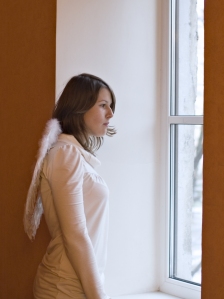 I'm convinced of that. This isn't working, (how's that for honest?) There has to be more. There has to be way to navigate life in a semi-healthy manner. Something to inspire and direct my artsy personality. Something to inspire my role as wife as and mother.
I'm convinced of that. This isn't working, (how's that for honest?) There has to be more. There has to be way to navigate life in a semi-healthy manner. Something to inspire and direct my artsy personality. Something to inspire my role as wife as and mother.
I used the think I had the answers. I had an encounter with God in my teen years that was life changing. I knew I had found something worth living for. And it worked for quite a while. I went to Seminary, married a Pastor and went into ministry. In many ways "I" was fulfilled. I had a growing brood of kids, my art was thriving, and I took great pleasure in my domestic career.
Then disaster struck. Some betrayals are easier to recover from than others. infidelity is devastating, but I would put forth that there is something worse....
When all your eggs are in the basket of church, of serving God and serving others, when that basket is ripped from your grasp and dashed on the ground....life as you knew it ends.
The death of relationships...
The death of dreams and hopes...
The death of inspiration and hope...
...and most devastating of all, the death of Faith!
I could have forgiven a husband, gone to counseling, healed a marriage...
...but how do you forgive God? He could have stopped what happened? I was His servant, why didn't he protect me? Why does an All Powerful God allow "Wolves in Shepherds clothing?"
When someone you trusted as Shepherd rips you to shreds, and leaves you to die...how do you ever trust God again?
These are some of the questions that have been running thru my mind for the last few years. Some I have found answers to. Like this....yes, there are wolves who rip apart sheep, but there are other shepherds who bind up wounds.
Yes, horrible things happened to me, but God never dropped me. There was a cool cup of water right when I needed it, there was a soothing balm placed on my wounds, and protective wings encased about when the attacks continued. Yes, God took very good care of me after the tragedy, but could I trust Him again?
Could I trust myself? No longer would I blindly follow anyone...innocence was ripped away from me.
It is good to be strong. To take care of ones self, but it is lonely and scary at times.
It is good to be safe and have boundaries, but what happens when they become prisons?
...and so, I'm not really living. I'm caught in limbo, somewhere between spiritual death and life. I hunger for God, for the hope of a life I once knew. I fear God, religion and church life.
...and yet this isn't living. Going thru life in response to a tragedy is good for a season. It protects and helps you face things about yourself you may not have had to before. Eventually, though new questions arise...
Who am I really? What do I need to live life abundantly? How do I move on?
and...Was everything lost, or are there a few eggs that didn't break?
This is my Journey. The journey beyond faith and to faith. A going deeper. A hope.




